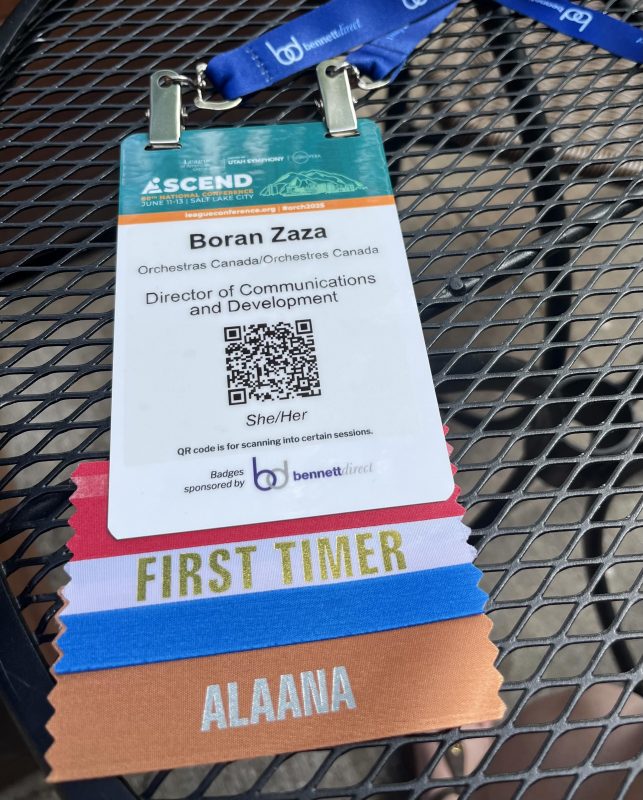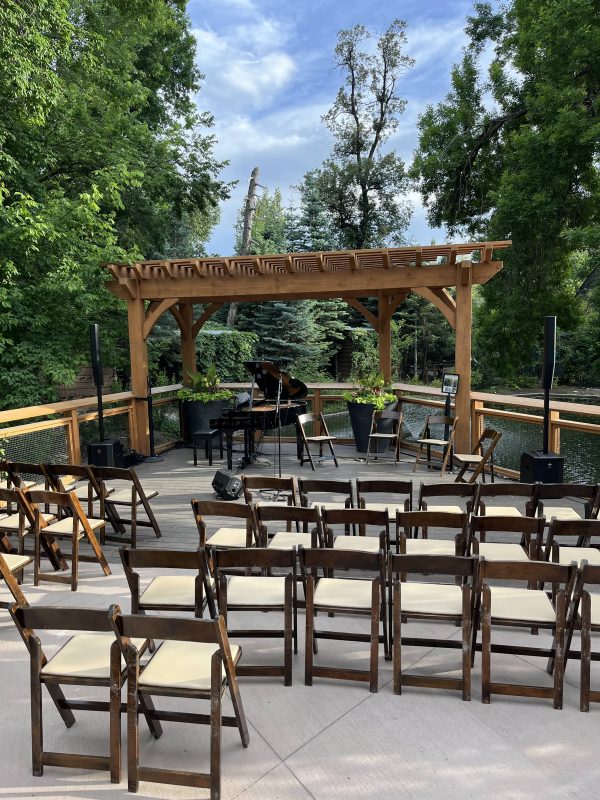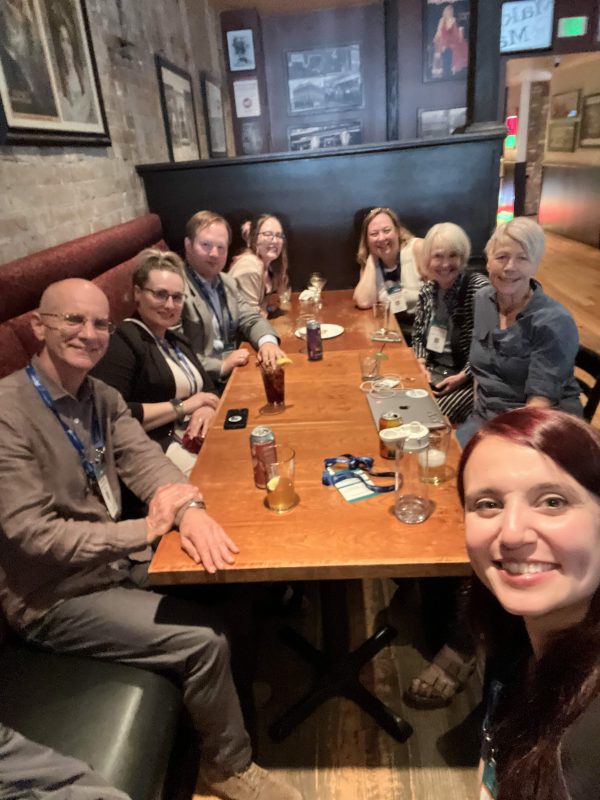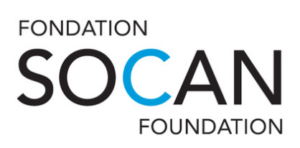
By Boran Zaza, Director of Communications & Development at Orchestras Canada.
 During my (ongoing!) master’s in management studies at HEC Montréal, I learned about the “Baumol cost disease.” – Sounds scary, I know…!
During my (ongoing!) master’s in management studies at HEC Montréal, I learned about the “Baumol cost disease.” – Sounds scary, I know…!
The core idea is that in certain sectors, like live music, productivity gains are inherently limited. You can’t exactly speed up a symphony without butchering the artistry, nor can you shrink the orchestra’s size without losing its richness. As operational costs increase over time (musician salaries, venue expenses, etc.), orchestras face a unique challenge: Unlike other industries, we can’t increase our productivity to make up for the rising costs.
While this concept was introduced to me at a marketing course, it really resonated with the fundraiser in me, and that’s exactly what was on my mind this past June as I attended three sessions focused on fundraising at Ascend, the League of American Orchestras’ 80th National Conference. The conference took place from June 10-13, 2025, in Salt Lake City, Utah.
“Communicating as One Team”: Building Internal Alignment

The “Communicating as One Team” session, featuring Kate Hagen (Senior Consultant, TRG Arts), Terry Loftis (President and CEO, New Jersey Symphony Orchestra), Andrew Goldberg (Senior Director of External Affairs, Ballet West), and Bruce D. Thibodeau (President and Founder of Arts Consulting Group), was an interesting one because it highlighted a subject that has already come up during a recent Orchestras Canada Peer meeting: the importance of internal alignment between the Marketing and Development teams.
It became clear that it’s crucial for both teams to not only work together but also to share a unified vision. How can we expect donors to connect with our story if we aren’t even telling the same story internally? A joint position (for the Director of Marketing and Development) can streamline communication and improve efficiency, but whether or not your orchestra has that structure in place, you must still ensure that the departments are cohesive, and that the audience members are not getting too many different messages from you.
Key Takeaways from this Session:
- Internal alignment is key: Marketing and development teams must share a unified vision and collaborate effectively. They’re working together, not in competition. Usually, marketing does their renewal campaigns, then when they’re done, development comes in. But if you have that collaborative approach, then your messaging is: Hello, dear major donor! It’s time to renew your subscription. It’s much more personal that way.
- Information sharing is crucial: Ensure all team members are aware of expectations and goals, and that those goals are for the organization as a whole, not just per department.
- Consider a joint position: Streamline communication and improve efficiency by combining marketing and development roles. This approach reduces the number of direct reports to the CEO/Executive Director, making it easier to make timely decisions without needing to consult multiple people.
Bonus idea that emerged from a recent Orchestras Canada peer meeting: What if we created a dedicated space – a lounge, a reception area – where longtime subscribers and donors could mingle before concerts and during intermissions? That’s right: usually this space would be hogged by the Development team and donors only. But what if it wasn’t? Imagine the potential for cross-pollination, for fostering a stronger sense of community, and for deepening their connection to the orchestra! It’s a simple idea, but one that could potentially pay dividends in terms of engagement, retention, and even increased giving/concert attendance.
“Strategies to Secure Fundraising Revenue in Times of Uncertainty”: Embracing Storytelling and Value
In the “Strategies to Secure Fundraising Revenue in Times of Uncertainty” session, Catherine Heitz New, CEO of RSC Associates, painted a vivid picture of the current economic realities, which was very much in parallel with what the Baumol cost disease is all about: She highlighted rising costs, earned revenue ceiling (there are only so many seats in the hall to sell), and the fact that fundraising is the growing piece of the pie! She suggested that fundraising is much more reliable and sustainable than cutting costs. Cutting costs is a mere band-aid because what’s scarce in our industry is not only the money: It’s also time and qualified people, according to her presentation.
Catherine also emphasized moving away from transactional requests and towards demonstrating the value and impact of donor support. It’s about telling the why of the music, our mission, and the experiences we create.
Key Takeaways from this Session:
- Provide flexibility to your major donors: If a donor says, “I can’t commit right now,” give them flexibility, such as flexibility with time – Making that major donation over 3-5 years rather than right now.
- Value-based messaging, not means-based: Emphasize the value and impact of donor support. A value-based message (good!) would be something like “music can have community-wide impact! It’s something you’re investing in, rather than consuming.” Means-based messaging (bad!) might sound like “your ticket only covers XX of our costs, so give us more money!”
- No blanket appeals to your board of directors: If you ask your board members for donations, don’t ask them all for the same amount using the same message! You can remind them individually of what they gave in the past, and make the case for increasing their gift. Don’t forget that your board members can also inspire others to give, so don’t hesitate to ask them for quotes and testimonials on why they support your orchestra.
I’ll leave you with one of my favorite quotes from this session, which shows the importance of making a specific ask:
“If you haven’t asked the donor for a specific amount, then you haven’t asked.”
“Development Constituency Meeting”: Planning for the Future
Karen Bippus, Director of Endowment and Planned Giving at the Chicago Symphony Orchestra, presented at the Development Constituency meeting and emphasized the importance of playing the long game and building a culture of planned giving in your orchestra.
It’s about fostering a sense of legacy, reminding donors that they can play a role in ensuring the orchestra’s survival for generations to come. It’s important to make the process accessible, to have individual conversations and learn about their priorities. Remember that planned giving is a very emotional decision – donors will be thinking of you as a close family member, and that’s how you should be treating them, too!
Key Takeaways from this Session:
- Pay close attention: A recent big life event (destabilizer) for a prospect (like a big move, retirement, birth of a child/grandchild) is a point where they are thinking about the big picture of their life. So, it might be a good time to make an ask if you are close to them! Whether it’s a major donation or a planned gift.
- Foster a sense of legacy: Remind donors that they can contribute to the long-term survival of the orchestra. Karen notes that when someone pledges a planned gift, their annual giving typically increases significantly, as they feel a stronger connection to your orchestra. So, asking for a legacy gift is not just an investment for the far future.
- Empower your prospects with information: Inviting a financial advisor to give a seminar to donors and prospects about planned giving is a good way to help them make an informed decision!
So, beyond the financial uncertainty that the Baumol cost disease presents, my general takeaway is that, ultimately, it is connections, clarity, and caring about humans that matter most: Building trust within our teams, being honest about our values, and fostering genuine relationships with our supporters can make all the difference. It’s about remembering that behind every donation, every concert, and every strategy, there are people who believe in what we do, and that shared belief is what will carry us forward, even through uncertain times.

To get a taste of the League of American Orchestras conference experience in video format, check out the Instagram stories I posted while in Salt Lake City! I am deeply grateful for the generous funding from the Canada Council for the Arts through the Supporting Artistic Practice: Professional Development for Arts Professionals program that made my attendance at Ascend possible. Stay tuned for the next (and last) blog post!
We acknowledge the support of the Canada Council for the Arts.



